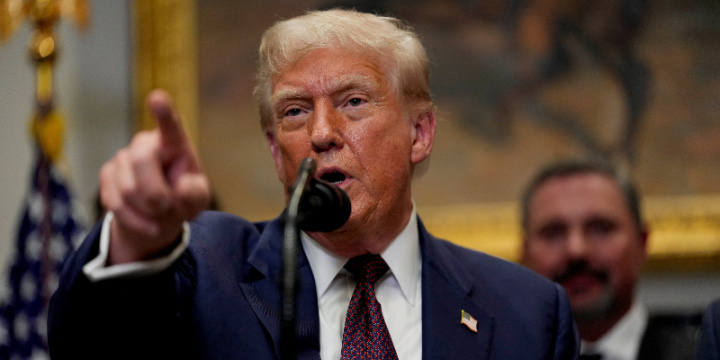US President Donald Trump points a finger as he delivers remarks in the Roosevelt Room at the White House in Washington, DC, US, July 31, 2025. Photo: Kent Nishimura via Reuters Connect
President Donald Trump’s administration is actively discussing with Azerbaijan the possibility of bringing that nation and some Central Asian allies into the Abraham Accords, hoping to deepen their existing ties with Israel, according to five sources with knowledge of the matter.
As part of the Abraham Accords, inked in 2020 and 2021 during Trump’s first term in office, four Muslim-majority countries agreed to normalize diplomatic relations with Israel after US mediation.
Azerbaijan and every country in Central Asia, by contrast, already have longstanding relations with Israel, meaning that an expansion of the accords to include them would largely be symbolic, focusing on strengthening ties in areas like trade and military cooperation, said the sources, who requested anonymity to discuss private conversations.
Such an expansion would reflect Trump’s openness to pacts that are less ambitious than his administration’s goal to convince regional heavyweight Saudi Arabia to restore ties with Israel while war rages in Gaza.
The kingdom has repeatedly said it would not recognize Israel without steps towards Israeli recognition of a Palestinian state.
Another key sticking point is Azerbaijan’s conflict with its neighbor Armenia, since the Trump administration considers a peace deal between the two Caucasus nations as a precondition to join the Abraham Accords, three sources said.
While Trump officials have publicly floated several potential entrants into the accords, the talks centered on Azerbaijan are among the most structured and serious, the sources said. Two of the sources argued a deal could be reached within months or even weeks.
Trump’s special envoy for peace missions, Steve Witkoff, traveled to Azerbaijan’s capital, Baku, in March to meet with Azerbaijani President Ilham Aliyev. Aryeh Lightstone, a key Witkoff aide, met Aliyev later in the spring in part to discuss the Abraham Accords, three of the sources said.
As part of the discussions, Azerbaijani officials have contacted officials in Central Asian nations, including in nearby Kazakhstan, to gauge their interest in a broader Abraham Accords expansion, those sources said. It was not clear which other countries in Central Asia – which includes Kazakhstan, Uzbekistan, Turkmenistan, Tajikistan and Kyrgyzstan – were contacted.
The State Department, asked for comment, did not discuss specific countries, but said expanding the accords has been one of the key objectives of Trump. “We are working to get more countries to join,” said a US official.
The Azerbaijani government declined to comment.
The White House, the Israeli foreign ministry and the Kazakhstani embassy in Washington did not respond to requests for comment.
Any new accords would not modify the previous Abraham Accords deals signed by Israel.
OBSTACLES REMAIN
The original Abraham Accords – inked between Israel and the United Arab Emirates, Bahrain, Morocco and Sudan – were centered on restoration of ties. The second round of expansion appears to be morphing into a broader mechanism designed to expand US and Israeli soft power.
Wedged between Russia to the north and Iran to the south, Azerbaijan occupies a critical link in trade flows between Central Asia and the West. The Caucasus and Central Asia are also rich in natural resources, including oil and gas, prompting various major powers to compete for influence in the region.
Expanding the accords to nations that already have diplomatic relations with Israel may also be a means of delivering symbolic wins to a president who is known to talk up even relatively small victories.
Two sources described the discussions involving Central Asia as embryonic – but the discussions with Azerbaijan as relatively advanced.
But challenges remain and there is no guarantee a deal will be reached, particularly with slow progress in talks between Armenia and Azerbaijan.
The two countries, which both won independence from the Soviet Union in 1991, have been at loggerheads since the late 1980s when Nagorno-Karabakh – an Azerbaijani region that had a mostly ethnic-Armenian population – broke away from Azerbaijan with support from Armenia.
In 2023, Azerbaijan retook Karabakh, prompting about 100,000 ethnic Armenians to flee to Armenia. Both sides have since said they want to sign a treaty on a formal end to the conflict.
Primarily Christian Armenia and the US have close ties, and the Trump administration is wary of taking action that could upset authorities in Yerevan.
Still, US officials, including Secretary of State Marco Rubio and Trump himself, have argued that a peace deal between those two nations is near.
“Armenia and Azerbaijan, we worked magic there,” Trump told reporters earlier in July. “And it’s pretty close.”
Click this link for the original source of this article.
Author: Reuters and Algemeiner Staff
This content is courtesy of, and owned and copyrighted by, https://www.algemeiner.com and its author. This content is made available by use of the public RSS feed offered by the host site and is used for educational purposes only. If you are the author or represent the host site and would like this content removed now and in the future, please contact USSANews.com using the email address in the Contact page found in the website menu.








